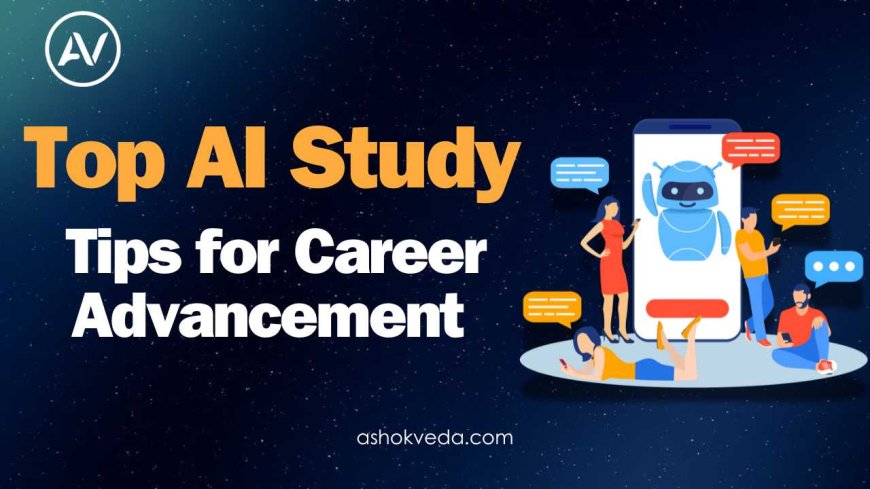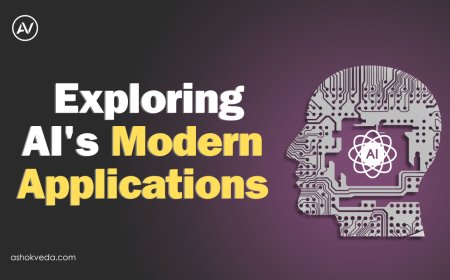How to Study AI for Career Advancement
Learn essential strategies and resources to effectively study AI and boost your career prospects in the growing field of artificial intelligence.

Future AI Genius! Have you thought about How to study AI for career advancement? In the present day, artificial intelligence is more than just a future concept; it is a transformational force that is influencing many different sectors. AI is changing the way we work, live, and play in fields as diverse as healthcare and finance. So, if you're wondering how to study AI for job progression, let's start experiencing the amazing field of artificial intelligence together!
Artificial intelligence, or AI, is the method of creating smart machines that can think and learn in the same way that people can. As businesses and organizations increasingly rely on AI to address difficult challenges, there is a growing demand for workers with this skill set. So, how do you get started? How do you study AI for job progression in a way that will prepare you for success?
The Basics: Understanding AI and Its Importance
Before getting into the "how," it's important to understand the "why." Why should you study Artificial Intelligence? Why is it such a valuable talent in today's job market?
AI includes a variety of technologies, such as Machine Learning, natural language processing, and robots. These technologies allow computers to perform tasks that traditionally require human intelligence, such as speech recognition, decision-making, and problem-solving. By studying AI, you put yourself at the forefront of innovation, ready to take on some of the world's greatest concerns.
Step 1: Start with the fundamentals
To study AI effectively, you must first understand the fundamentals. Here are some important things to focus on
Mathematics and Statistics:
-
Artificial intelligence relies greatly on mathematical principles. Learn linear algebra, calculus, probability, and statistics. These fields represent the foundation of AI algorithms and are necessary for anyone interested in studying AI.
Programming:
-
Learning to code is important. Python is the most often used language for AI development due to its simplicity and rich libraries. Begin with Python and explore libraries like NumPy, pandas, and TensorFlow. Mastering these technologies is an important step toward good AI research.
Data Structures and Algorithms:
-
Understanding data structures (like arrays, linked lists, and trees) and algorithms (such as sorting and searching) is crucial. These concepts help you design efficient AI solutions and are fundamental in your journey to study AI.
Step 2: Get into Machine Learning
Machine learning is an essential component of AI. It is the process by which computers learn from data and make predictions or choices. Here's how to get started with machine learning and study AI.
Online courses:
-
Enroll in online classes to study the basics of Machine Learning with top online platforms that provide courses from major universities. Look for classes that discuss guided and unsupervised learning, neural networks, and deep learning. These courses are excellent tools for anyone interested in studying Artificial Intelligence
Books & Tutorials:
-
There are multiple excellent books on machine learning. Some popular ones include "Hands-On Machine Learning with Scikit-Learn, Keras, and TensorFlow" by Aurélien Géron and "Pattern Recognition and Machine Learning" by Christopher Bishop. Additionally, use tutorials to gain hands-on experience. Reading and practical application are the foundations of successful AI education.
Projects:
-
Practical experience is valuable. Work on tiny tasks to use what you've learned. Begin with easy tasks, such as creating a linear regression model or a decision tree classifier. Real-world initiatives are essential for those studying AI and seeking ways to improve their professions.
Step 3: Explore Specialized AI Fields
Depending on your interests, you can study AI in specific areas and further study AI
Natural Language Processing (NLP):
-
NLP focuses on the interaction between computers and human language. Learn how to build models that can understand and generate text. Popular libraries for NLP include NLTK and SpaCy. If you're interested in language technologies, this is a great area to study AI.
Computer Vision:
-
This field deals with enabling computers to interpret and process visual information. Explore image recognition, object detection, and facial recognition. Libraries like OpenCV and PyTorch are commonly used. Specializing in computer vision is a smart move for those who study AI and aim to work in tech-heavy industries.
-
If you're fascinated by robots, consider studying robotics. This involves designing and programming robots to perform tasks autonomously. ROS (Robot Operating System) is a popular framework for robotics development. Robotics is a compelling field for anyone looking to study AI and make a tangible impact.
Step 4: Get Certified
Certifications can help you build credibility and showcase your knowledge to future employers. are some well-known AI certifications that might help you learn AI:
Google AI Certification:
-
Google offers a variety of courses and certifications through its Google AI platform. These certifications cover topics like machine learning, data engineering, and Deep Learning.
Microsoft Certified: Azure AI Engineer Associate:
-
This certification focuses on using Microsoft Azure services to build AI solutions. It's ideal if you're interested in working with cloud-based AI technologies.
IBM AI Engineering Professional Certificate:
-
Offered by IBM on Coursera, this certification covers machine learning, deep learning, and AI engineering. It's a program designed for aspiring AI professionals. Obtaining certifications is a powerful step in how to study AI and enhance your career prospects.
Step 5: Join AI Communities and Network
Networking is necessary for professional development in any sector, including AI. Joining AI groups and connecting with like-minded individuals can lead to new opportunities.
Online Forums:
-
Participate in forums like Reddit's r/MachineLearning and Stack Overflow. These platforms are great for asking questions, sharing knowledge, and staying updated on the latest trends.
Meetups and Conferences:
-
Attend local AI meet-ups and industry conferences. Events like these provide valuable networking opportunities and allow you to learn from experts in the field.
Professional Organizations:
-
Join professional organizations such as the Association for the Advancement of Artificial Intelligence and the Computational Intelligence Society. Membership often includes access to exclusive resources and events. Networking and professional engagement are key aspects of how to study AI effectively.
Step 6: Build a Strong Portfolio
Document your projects.
-
Prepare deep write-ups for each project you complete. Include the problem you solved, the method you used, and the outcomes you obtained. Use GitHub to host and make your code available to others.
Blog About Your Journey:
-
Create a personal blog to share your project and learning experiences. Writing about how to study AI and your progress strengthens your understanding and demonstrates your love for the subject.
Contribute to open-source:
-
AI projects Contributing to these projects demonstrates your ability to work collaboratively and tackle real-world coding challenges. Anyone interested in studying AI and impressing future employers should have an active and well-documented portfolio.
Step 7: Apply Your Skills to Real-World Scenarios
Practical experience is a must when studying artificial intelligence. Look out for ways to use your talents in real-world circumstances and understand how to research AI.
Internships:
-
Seek internships at companies focusing on AI projects. Internships provide hands-on experience and can lead to full-time employment opportunities.
Freelancing:
-
Offer your AI abilities as a freelancer. AI professionals can find multiple possibilities on websites such as Upwork and Freelancer.
Competitions:
-
Participate in artificial intelligence competitions on platforms such as Kaggle. These challenges require you to tackle real-world problems and can help you acquire popularity within the AI community. Real-world applications are an important part of learning AI and moving forward in your career.
Studying AI for career advancement can be interesting and profitable. By taking these steps, you may lay a strong foundation, get hands-on experience, and position yourself as a valuable asset in the job market. Keep in mind that effort and an honest desire to learn are important for success. Begin your search to learn how to study AI today and open the door to a world of unlimited options in this bright profession!





































